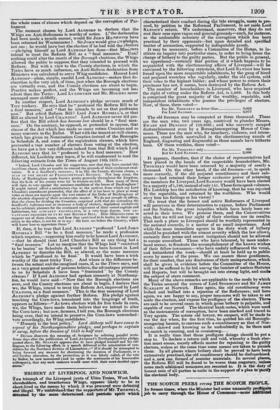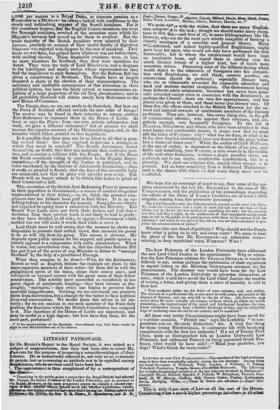THE' SCOTCH PEER$ • Fersiq. THE SCOTCH, 1740.PLIt IN former
times; when •the Minister •had some unusually profligate job -to carry through -the. liouse of Connnons—sotite 04ditionel 6.0:01/...per annum to Vie, er sinecure, pension to ai 'Aa.knrooritDnranastie altvays looked with to the -Steady and Unblushing anliptrt 'Of the Scotch Merdiem. For. it did sometimes 'happen; that thetnglishCbutityineinbera, nay even
the Borough nominees, revolted at the nauseous mess which his
Majesty's servants has served up for them to' swallow. But the 'great majority of the -Scotch members were selected by their patrons, precisely on "account of their useful facility of 'digesting -Whatever was itected with disgust by the rest Of mankind. They 'Made no wryfirces, but gulped down whatever was set before their., 'with smiling alacrity. These despicable creatures were, in fact,
no 'more Members for Scotland, than they were members for Arcot. They were 'the tools- of Lord 1VISLviti.s, and a disgrace ' to the intelligent and manly nation whose representatives they 'had the impudence to style themselves. But-the Reform Bill has
'given a constituency to 'Scotland. The People have at length 'acquired -a share in the election of their, representatives. The :necessary and 'creditable consequence of this alteration in their ',political system, has been the hasty retreat or unceremonious ex- ,pulsicin of a large proportion of the old Tory placehunters; and in all, probability Scotland' will return nearly forty Reformers to the -near House of Commons.
The People, then, we see, are ready to do their duty. • But how are the Peera of SCOtlaad: affected. towards the new order of things? The -answer may be found in their intention to return_sixteen 'Anti-Reformers to represent 'them in the House of Lords. At
least so. says the Times: from 'our Own private information last 'Week, we gave a different Statement:* but at present we shall "assume the superior accuracy of -the Ministerial organ, and, in the .:-remarks which follow, proceed on that hypothesis.
. Is 'it possible that these men can be so blind to all that is pass- ing around them? 'Are_ they resolved to provoke a struggle in
which they, must be crushed? The Scotch Aristocracy flatter
themselves, no thsubt; that they' can maintain their exclusive posi- tion, and 'so escape a collision with . the. People. But if the Peers -are 'found constantly voting in opposition to the Popular Repre-
.Selitatives,—if the strength of -the- Nation is paralyzed, and its i vice' stnotheied, by the incubus of Aristocratic 'domination, —then itueeds no,p.ophet to foretel, that the days of this incurable body --aretiumbered, and "that its glory will speedily- pass .away. The 1-People willaro longer. 'submit to 'be driven like mules to grind at itheir Conservative mill.
This resolution.of the'ScotchAnti-ReforreingPeers to persevere their'oppAtion to Government, —a course of conduct altogether 'unprecedented: in their history,—is, we think,'the greatest cora-
,pliment-that has , hitherto been paid to Earl GREY. It is an un-
willing tribute to' his character for honesty. Snug jobs are clearly "not expected:to-spring. from' a connexion with his Ministry. The 'Scotch Tory Lords' have put forth their feelers,' and find that a deviation from- their present track is not likely to lead to profit : 'so they 'have decided, at all' risks, to oppose a-Government Which , neither can nor Will Make it worth their while to serve it.
: Lord GREY must be well aware, that the moment he shows any disposition to promote,their selfish Views, that moment his ,power
'to do so will slip froth' his.grasp. The reason is obvious.. He 'depends Upon public opinion for his support, and public opinion is 'Utterly opposed to a compromise with noble placehunters. What
is worse, but nevertheless true, is, that the relentless Reform Bill )ias -put it out of-the power,of any Minister in future to "manage Scotland" by the help of aprostitutedPeerage.
What then remains to :be done?----Why, let the Aristocracy, `Scotch as Well as English, imitate the example-set them by the
pore sagacious members of their order—let them fall in' with the
tenlightened -spirit of the times, shape their course anew, and relinquish' an unequal contest with- the great mass of their fellow countrymen. :The -nobility-have succeeded so completely -in nne great .objeet 0. aristocratic .longing,—tney have become so the- ,roughly "exclusive,"—tbat every one begins to perceive their ossentialiuSiguificanco. Nothing, we are convinced,' can preserve them from destruction,but a change- for the- better in. their political livesjind Conversation.: We tender them this advice in all sin- :cerity ; -for v.7e.are anxious to ,see each member of the State duly perform the functions which the British Constitution has assigned
to it. The functions of thellouse of Lords are important, and pay beu.sefid in-a high degree; Int how have they been, for the most partaierformed? . •
-.1■:flithe.second,edition of the:Spectator. -Our estimate Was, that there would-be priaine Ministerialistsout of the sixteen.
3+3



























 Previous page
Previous page